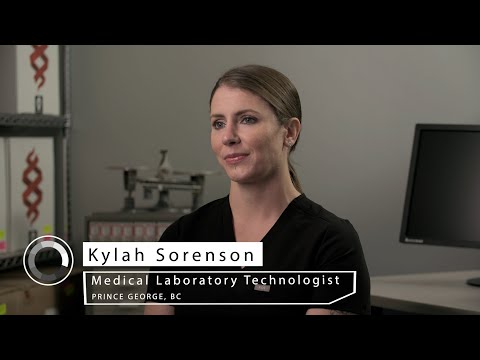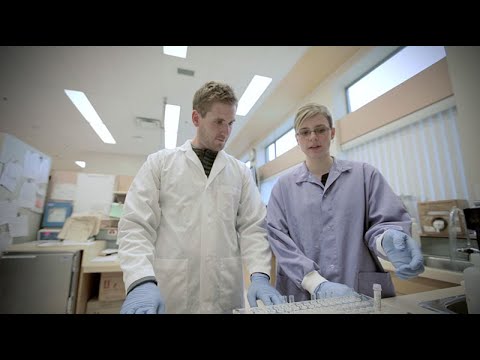Career Overview
Medical laboratory technologists conduct medical laboratory tests, experiments and analyses to assist in the diagnosis, treatment and prevention of disease. Medical laboratory technologists who are also supervisors are included in this group.
People in this occupation:
- Must be detail oriented and able to follow strict procedures
- Must be able to work both independently and as part of a team
- Should have good interpersonal and communication skills
Medical laboratory technologists work in many settings including medical laboratories in hospitals, blood banks, community and private clinics, research facilities and post-secondary educational institutions.
Job Titles
Duties
Medical laboratory technologists may specialize in particular areas, such as clinical chemistry, clinical microbiology, hematology, histotechnology, transfusion science, or immunohematology, cytotechnology and molecular genetics. Workers perform varying duties described below.
Special duties
- Set up, operate and maintain laboratory equipment
- Do chemical analyses of blood, urine, cerebro-spinal fluid or other body fluids; study blood cells and other tissues to determine their relation to various physiological and pathological conditions
- Prepare tissue sections to demonstrate special cellular tissue elements or other characteristics for microscopic examination
- May establish procedures for the analysis of specimens and for medical laboratory experiments
- Do blood group, type and compatibility tests for transfusion purposes
- Validate, document and report test results
- Conduct quality control assessment of testing techniques
- May supervise and train other medical laboratory technical staff, students and helpers
- May assist pathologists during autopsies
Earnings
Earnings is income that workers receive in exchange for their labour. Depending on the type of employment, earnings can be in the form of wages (hourly), salaries (fixed monthly or annual) or self-employed earnings.
Work Environment
# Workers Employed
2,535% Employed Full Time
70%Most medical technologists typically work 35–40 hours per week. Working hours vary depending on the type of laboratory. Those working in diagnostic clinical laboratories or hospitals may work rotating shifts of days, evenings and nights, including weekends and holidays. Medical technologists in research laboratories usually work regular week day hours.
Work takes place in bright, well-ventilated laboratories. During their workday, workers may perform a variety of tests or they may repeat the same tests throughout the day. They use solutions and reagents for their work, which may have unpleasant odours. These workers may come in contact with infectious patients, samples or hazardous chemicals, so safety precautions are taken to avoid risks.
Career Pathways
Graduates may work in a number of different settings, such as private laboratories, community health clinics, public health facilities, university research labs, biotechnology companies, and specialty labs.
With education and experience, workers may progress to supervisory or senior management positions or they may choose to teach or work in private industry. Advanced certification (ART) is available from the Canadian Society for Medical Laboratory Science for technologists who want to go after management opportunities.
Related Careers
Occupational Interests
It’s important to understand what kinds of occupations align with your interests.
For more about occupational interests visit Skills for the Future Workforce > Characteristics.
Here are the top occupational interest(s) for this career profile:
Education, Training and Skills
- Medical laboratory technologists must complete a two- or three-year college program in medical laboratory technology
- Supervised practical training may be required
- Certification by the Canadian Society for Medical Laboratory Science (CSMLS):
- Is available for medical laboratory technologists and is usually required by employers in B.C., although it is not mandatory at this time
- Registration with a regulatory body is required in Alberta, Saskatchewan, Manitoba, Ontario, New Brunswick, Nova Scotia, Newfoundland and Labrador
- Combined laboratory and X-ray technicians require completion of a combined laboratory X-ray technology program.
- Some employers may require a university science degree for specialized medical laboratory technologists.
Education programs in B.C.
The following program areas are related to this occupation:
- Medical Laboratory Related

Skills
Every job calls for a certain set of skills. Knowing those skills is the first step in finding a good career fit.
Here, you will find the 10 most relevant workplace skills. Some are more important to achieving success in a certain career than others. These skills may come naturally to you or you may need to gain them through education, training and experience.
See the list of work-related skills below, ranked in order of importance for this career. Check out the list and see if this career matches your skills—take that first step!
Giving full attention to what other people are saying, taking time to understand the points being made, asking questions as appropriate, and not interrupting at inappropriate times.
Understanding written sentences and paragraphs in work-related documents.
Using logic and reasoning to identify the strengths and weaknesses of alternative solutions, conclusions or approaches to problems.
Talking to others to share information effectively.
Communicating effectively in writing as appropriate for the needs of the audience.
Considering the relative costs and benefits of potential actions to choose the most appropriate one.
Being able to solve novel, ill-defined problems in complex, real-world settings.
Keeping track of and assessing your performance, other individuals, or organizations to make improvements or take corrective action.
Understanding how new information could be used to solve current and future problems in making decisions.
Being aware of others’ reactions and understanding why they react as they do.
Labour Market Statistics
Discover data, facts and information that have been gathered and analyzed. Learn about the characteristics of the economy and labour market in B.C.
Employment
Find out about employment types and trends by region and industry.
Employment
2,535Employment by Region







| Region | Employment | % Employment of this Occupation |
|---|---|---|
| Cariboo | 65 | 2.6% |
| Kootenay | 65 | 2.6% |
| Mainland/Southwest | 1,715 | 67.5% |
| North Coast and Nechako | 40 | 1.6% |
| Northeast | 10 | 0.4% |
| Thompson-Okanagan | 280 | 11.0% |
| Vancouver Island/Coast | 360 | 14.2% |
Labour Market Outlook
The B.C. Labour Market Outlook is a 10-year forecast of the expected supply and demand for labour in the province. It’s usually updated every year. The purpose is to provide British Columbians with the knowledge to make informed decisions on careers, skills training, education and hiring.
Forecasted Job Openings (2024-2034)
1,670Forecasted Job Openings
Forecasted Employment Growth Rate
Composition of Job Openings
Job Openings by Region (2024-2034)







| Region | Job Openings | Avg. Annual Employment Growth |
|---|---|---|
| Cariboo | 40 | 1.5% |
| Kootenay | 30 | 1.1% |
| Mainland/Southwest | 1,150 | 2.2% |
| North Coast and Nechako | 10 | 0.4% |
| Northeast | Not available | Not available |
| Thompson-Okanagan | 160 | 1.9% |
| Vancouver Island/Coast | 280 | 2.4% |
Industry Highlights
Learn about the opportunities in B.C.'s major industries, including employment trends, earning potential, locations of work and more.
Forecasted Job Openings by Industry
| Industry | Job Openings (2024-2034) |
|---|---|
| Health Care and Social Assistance | 1,630 |
| Professional, Scientific and Technical Services | 30 |
| Public Administration | 10 |
Insights from Industry
Job openings will come from job creation and the need to replace retiring workers, with job growth outpacing openings from retirements.
Industry sources report a current shortage of medical laboratory technologists in B.C., which is expected to continue in the coming years.
The growing demand for health-care services will increase job opportunities for medical laboratory technologists. In particular, hospitals and medical laboratories that provide contracted diagnostic services are expected to experience growth that will create new job opportunities.
Industry sources also report that there will be an increased demand for general medical laboratory technologists throughout Canada, and that workers in rural and remote communities may be particularly needed. An increased demand for clinical genetics technologists is expected as a result of the growth of molecular testing. A decrease in demand for diagnostic cytology technologists is also expected as a result of automation.
The introduction of simplified tests for routine diagnoses allow doctors and, in some cases, patients to carry out some tests themselves, which has reduced the number of medical technologists. However, the development of new diagnostic tests now requested by physicians has balanced this effect by increasing job opportunities.
Resources
-
B.C. Ministry of Healthwww.gov.bc.ca/health/
-
BC Biomedical Laboratorieswww.bcbio.com/
-
BC Provincial Blood Coordinating Officewww.pbco.ca/
-
British Columbia Society of Laboratory Science (BCSLS)www.bcsls.net/
-
Canadian Blood Servicesblood.ca/
-
Canadian Blood Services – Job Seekersblood.ca/en/job-seekers
-
Canadian Medical Association (CMA)www.cma.ca/
-
Canadian Society for Medical Laboratory Science (CSMLS)www.csmls.org/
-
Fraser Healthwww.fraserhealth.ca/
-
Health Match BCwww.healthmatchbc.org/
-
Interior Health – Jobsjobs.interiorhealth.ca/
-
Island Healthwww.islandhealth.ca/
-
Northern Health – Careerscareers.northernhealth.ca/
-
Provincial Health Services Authoritywww.phsa.ca/
-
Vancouver Coastal Health (VCH)www.vch.ca/










